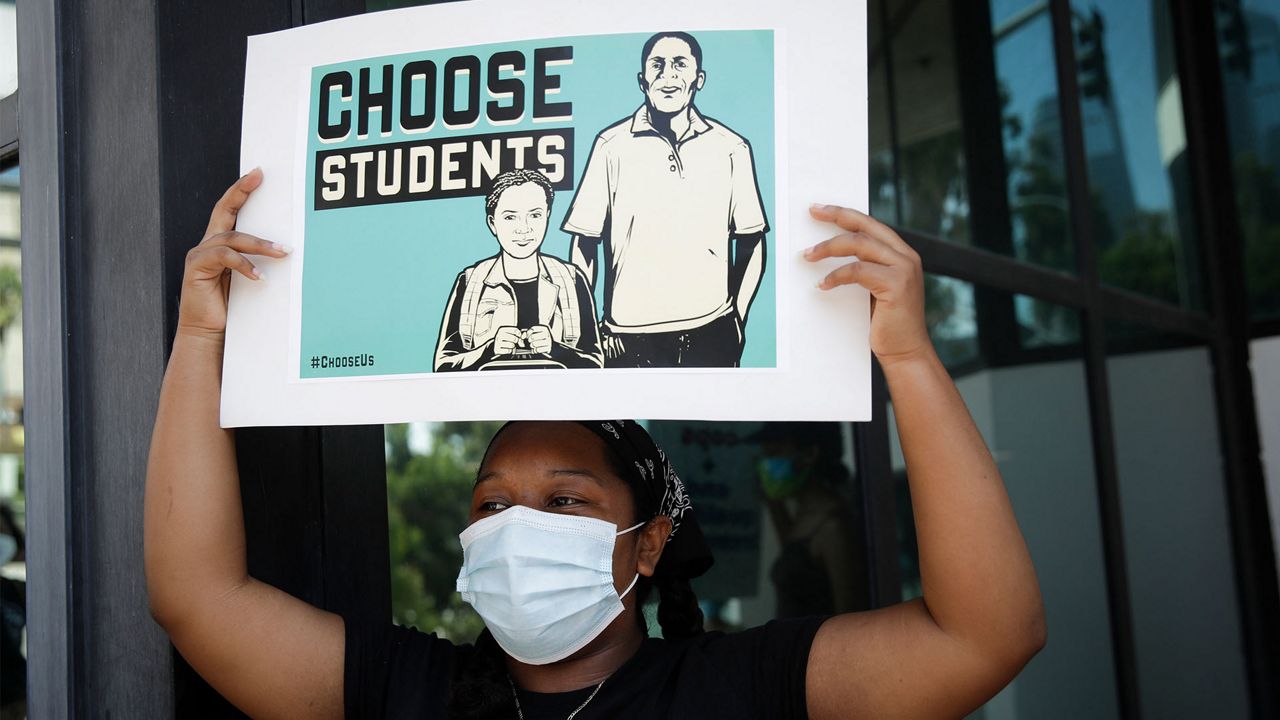LOS ANGELES (CNS) — Los Angeles Unified Superintendent Austin Beutner shared more details on Monday, August 17 of a COVID-19 testing and contact tracing program for school district staff, students and their families, with the testing set to begin with on-campus workers.
Although school campuses remain closed this fall as students learn in virtual classrooms, workers who are back at schools — as well as any of those workers' children receiving on-campus childcare services — will be the first to receive testing, Beutner said.
Los Angeles Unified plans to eventually test all staff and students over time. The goal in the early phase is to establish a baseline. After that, there will be periodic testing of staff and students grouped in cohorts as well as testing for family members of students and staff who test positive or family members who show symptoms.
The superintendent called the unprecedented testing and tracing efforts “extraordinary actions'” mandated by “extraordinary circumstances.”
He emphasized, “This program will provide public health benefit to all in the school community as well as the greater Los Angeles area. It will also provide significant education benefits for students as it will get them back to school sooner and safer and keep them there.”
The spread of COVID-19 in the Los Angeles area far exceeds guidelines from the state governing the possible return of students to school campuses. Any decision about the return of students to schools is some time away, the statement acknowledged. The launch of the program is designed to be a system that will be built and tested, and provide a base of knowledge to help prepare for an eventual return to school campuses.
District officials said a recent survey of employees found that “88 percent felt a robust system of testing and contact tracing at schools would make them safer.”
They also believe testing will help the district be set up for students to return to the classroom and keep them there if an isolated outbreak were to occur.
“This program will also provide significant education benefits for students by getting them back to school sooner and safer and keeping them there,” Beutner said. “We hope this effort also will provide learnings which can benefit other school systems and communities across the nation as we all combat this pandemic.”
It will cost an estimated $300 per student per year to pay for tests and tracing for students, staff and family members. Beutner said the benefits outweigh the costs: “This is about something that can't be measured in dollars and cents; it's about creating opportunity for children. A good education is the path out of poverty for many students and the promise of a better future for all of them.”
Board of Education members, too, have voiced their support for testing and tracing.
“The establishment and rollout of this robust testing and tracing program underscores Los Angeles Unified's commitment to prioritizing the health and safety of our students, faculty and staff,” Board Member Dr. George J. McKenna III said. “The data and learnings from this program will be critical in allowing Las Angeles Unified to assess and determine any possible next steps in transitioning to a different learning environment.”
The testing and contact-tracing program and its corresponding research are a collaboration between LAUSD and scientists from UCLA, Stanford University, Johns Hopkins University, Microsoft and healthcare companies Anthem Blue Cross and Health Net. They will be part of a task force co-chaired by Beutner and former U.S. Secretary of Education Arne Duncan.
Strategic interpretation of the evidence on testing and epidemiological modeling will be provided by Johns Hopkins, Stanford and UCLA, which are providing their services pro bono.
“UCLA will bring breadth and depth of scientific expertise to study the impact and effects of Los Angeles Unified's reopening plan and to share the information learned from these research efforts throughout the world,” said Dr. Steven M. Dubinett, director of the UCLA Clinical & Translational Science Institute.
LAUSD's roughly 75,000 staff serve about 700,000 students who are in regular contact with another 2 million to 3 million people, which makes testing on such a scale a “daunting” task, but one that must be undertaken, Beutner noted.
“If it was easy, it would have been done already,” he said. “A pilot program is likely to experience difficulties, some we can anticipate and some we cannot. The labs may have issues, test results might be late, students or staff might be absent on the day of testing at a school or contact tracing efforts might not reach every family. But if it works, it can be a model for other school districts and communities across the country. Critics may challenge the cost. But if we can isolate even just a few cases and keep others from the harm the virus causes, it will be worth it.”



